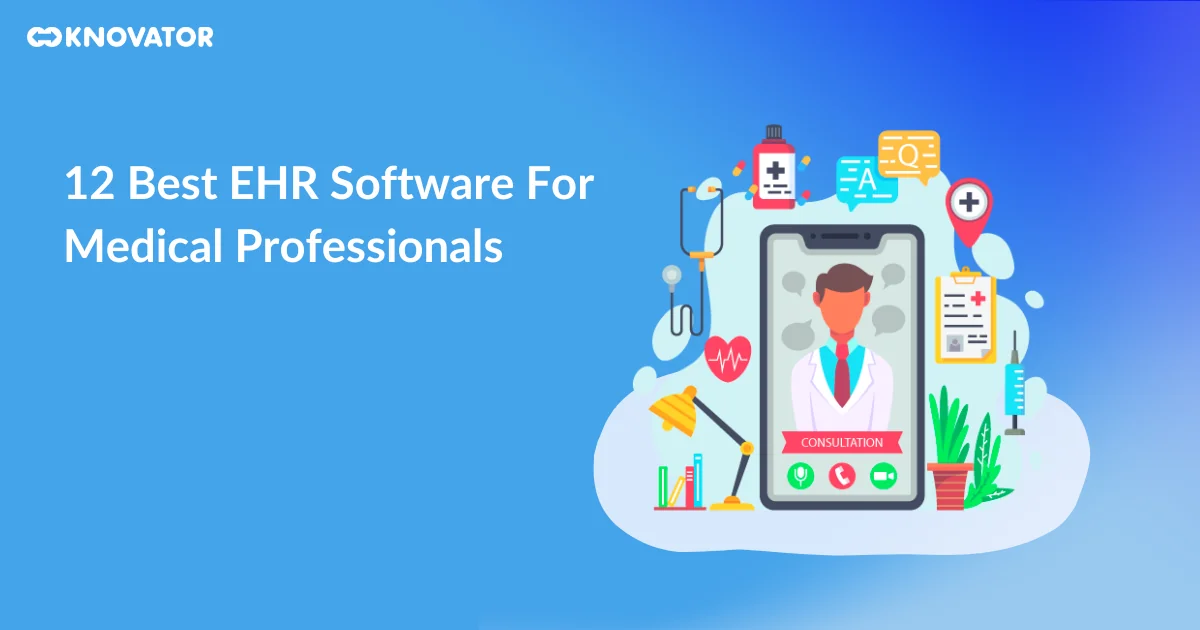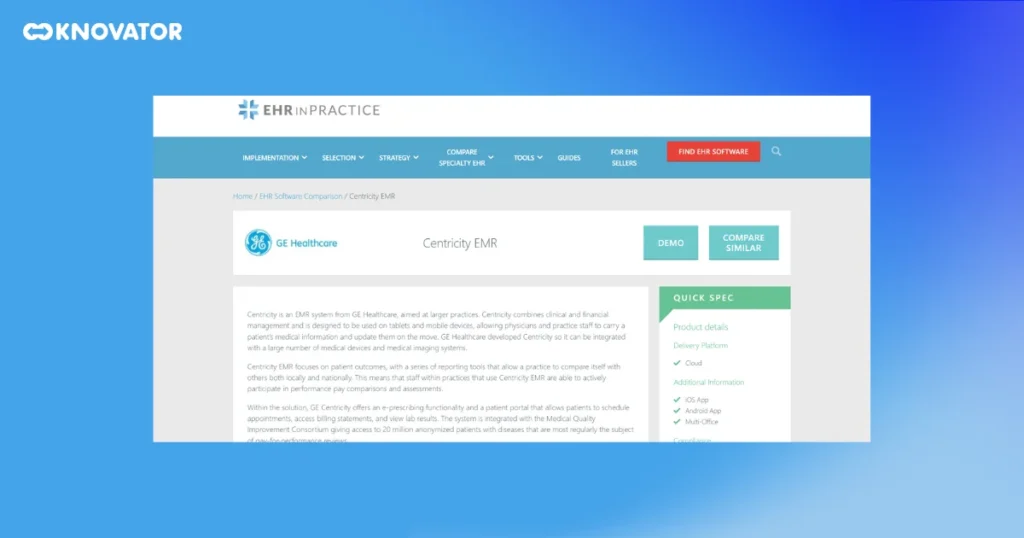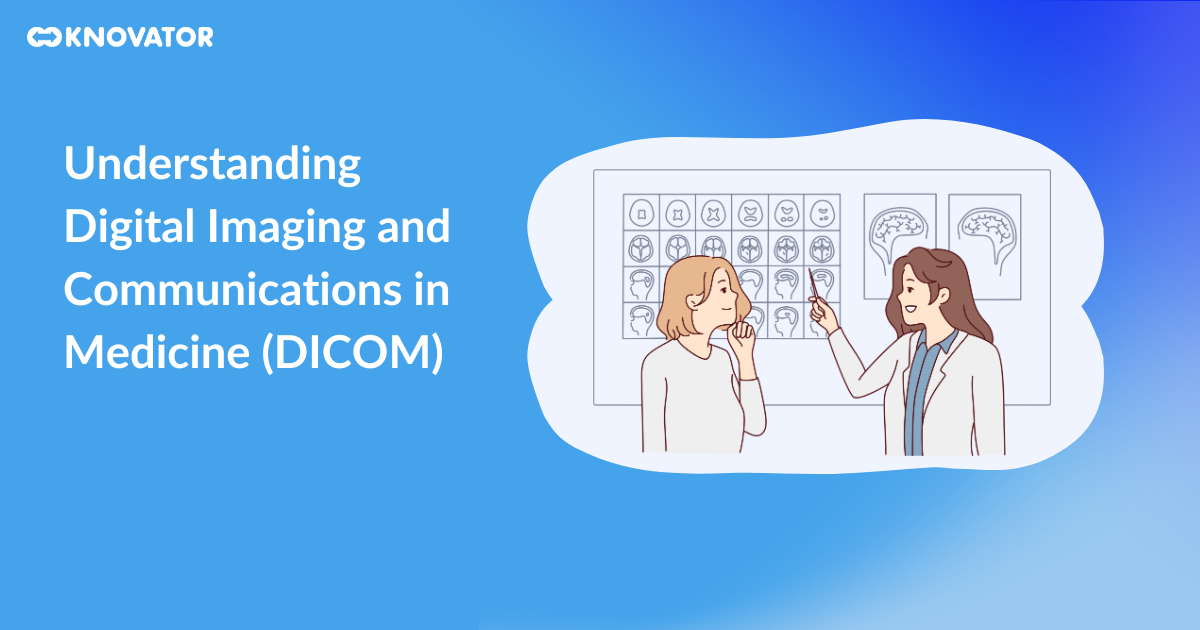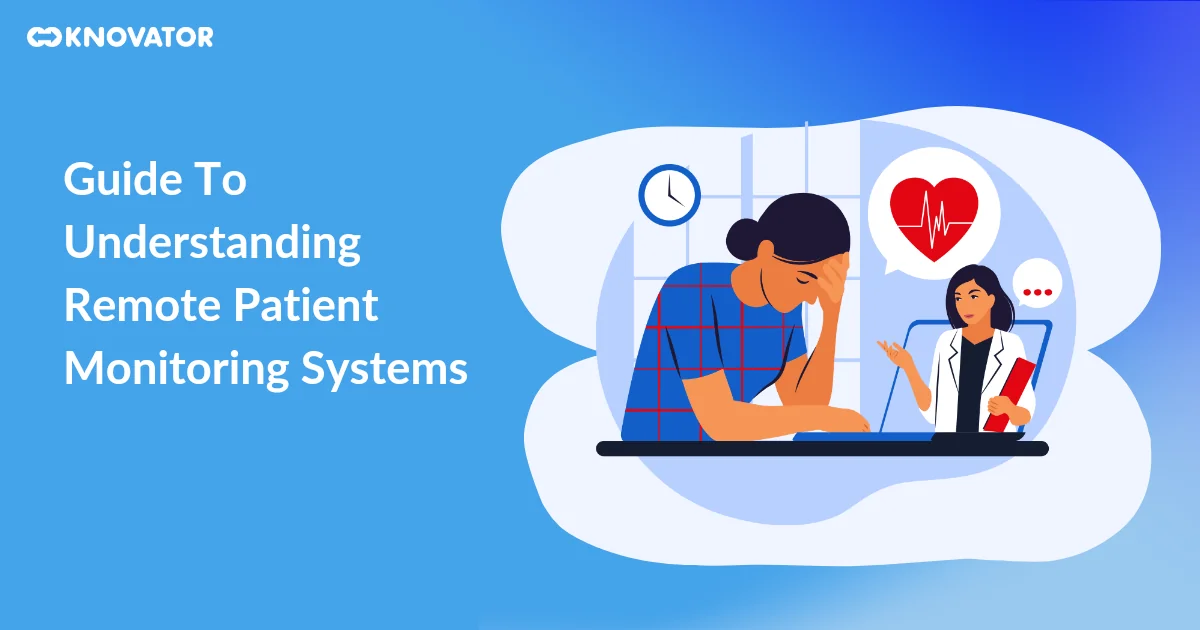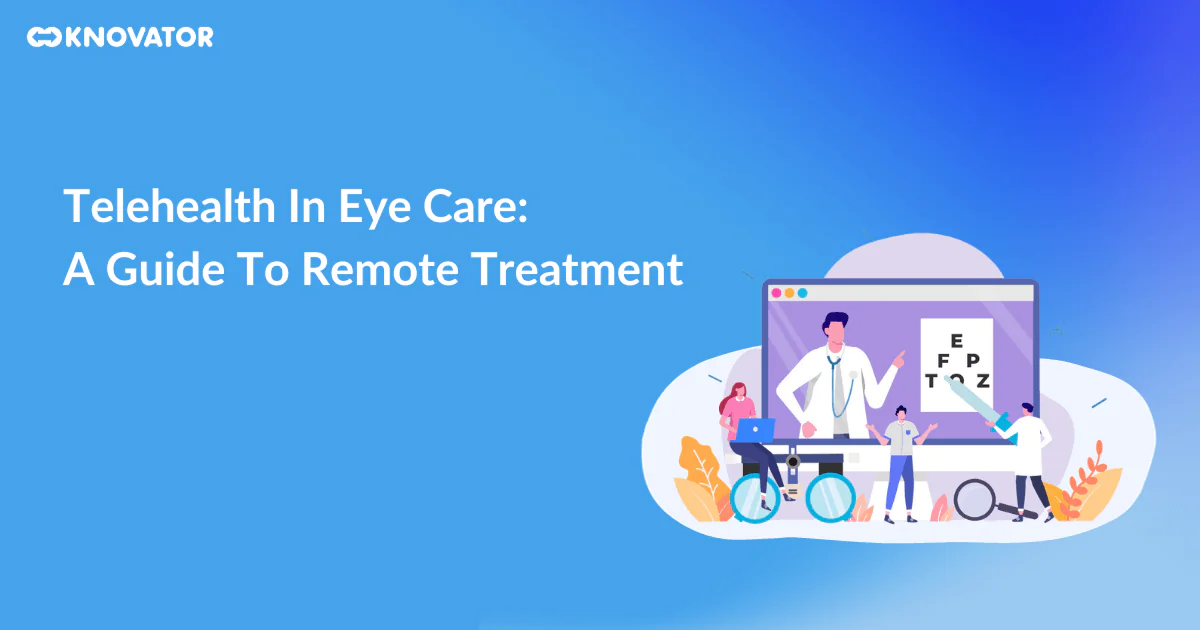94% of providers say EHRs provide quick and easy access to patient records. This shows that electronic health records (EHRs) are essential for improving patient care. With an EHR, providers can quickly access patient information, which may help them to make better treatment decisions.
Many different EHR software solutions are available, so it can be difficult to choose the right one for you.
Therefore, to help you out, we will look at the top 12 best EHR software for medical professionals in this blog post. We’ll consider factors like ease of use, functionality, and cost to help you find the best EHR for your needs.
What Is Electronic Health Records Software?
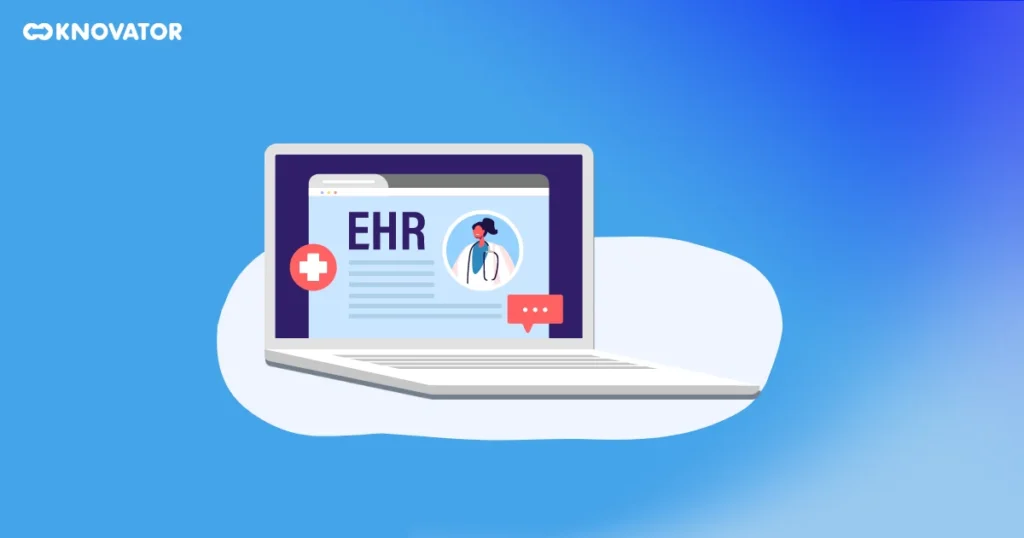 Electronic health records (EHR) software is a computer program that manages patient health information. It is a digital version of the traditional paper medical chart. Besides, it allows healthcare providers to access patient records anywhere in the world.
Electronic health records (EHR) software is a computer program that manages patient health information. It is a digital version of the traditional paper medical chart. Besides, it allows healthcare providers to access patient records anywhere in the world.
Moreover, it is possible to share this information with other providers in health management. This advancement enhances the quality of care and simplifies healthcare management for patients. Further, EHR software helps to reduce medical errors, improve efficiency, and save money.
How To Choose The Best EHR Software For You?
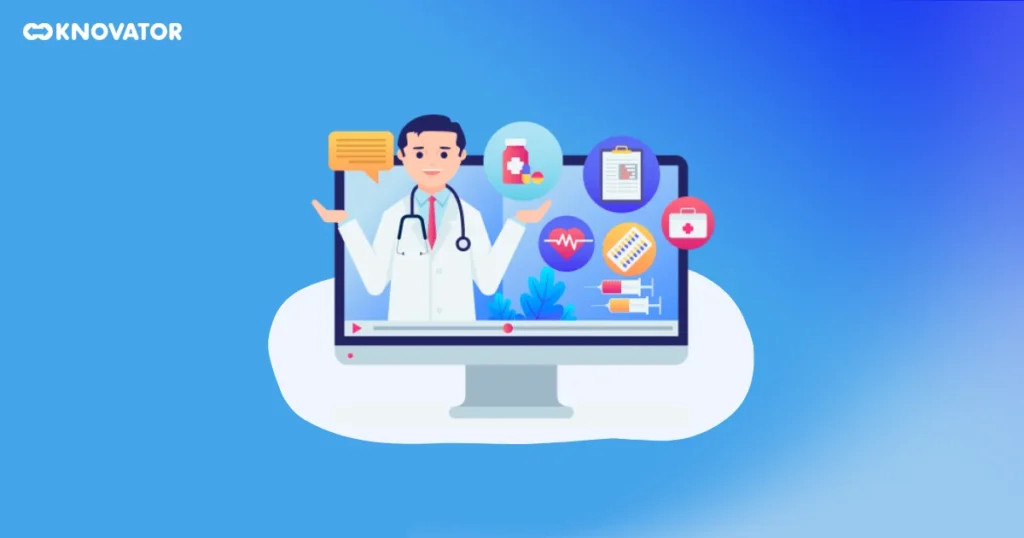 Here are some tips on how to choose the best EHR medical software for you:
Here are some tips on how to choose the best EHR medical software for you:
- Consider your needs. What features are important to you? What kind of practice do you have? How many patients do you see?
- Do your research. Read reviews, compare features, and talk to other healthcare providers using EHR software.
- Get quotes from different vendors. Don’t just choose the first EHR software you see. Get quotes from a few vendors so you can compare prices and features.
- Make sure the software is HIPAA compliant. This means that the software will protect your patients’ medical information.
- Choose a cloud-based system. This will make it easier to access your data from anywhere.
The Best Electronic Health Records Software
While choosing the different types of EHR systems, it is necessary to consider your specific needs. Since many types of EHR software are available on the market, it is essential to research and find one that best fits your needs.
Let’s discuss the top 12 electronic health record systems:
1. Epic EMR
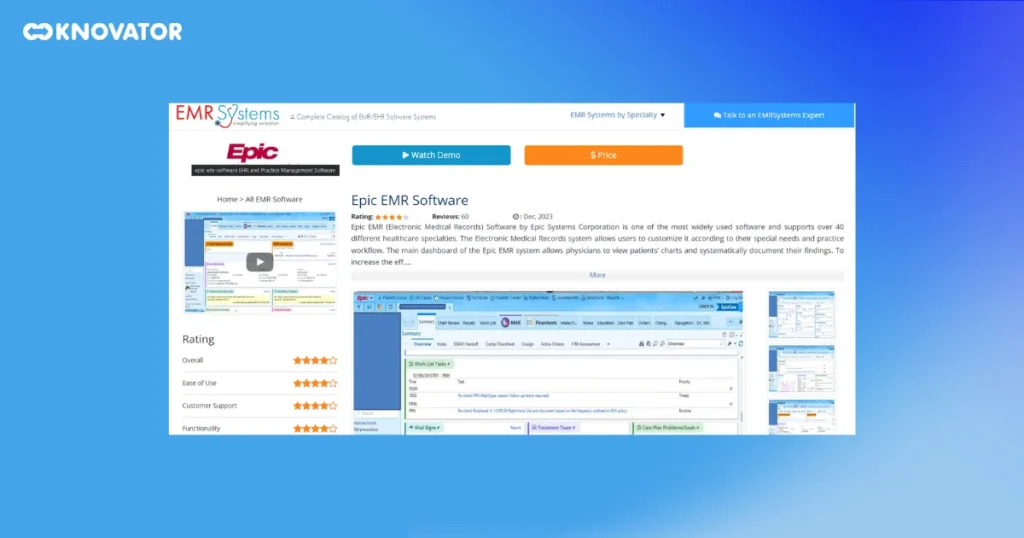 Epic EMR is both an electronic medical record (EMR) system and an EHR widely considered one of the best in the world. It is highly customizable, allowing healthcare organizations to tailor it to their needs. This makes it a good choice for organizations of all sizes and specialties.
Epic EMR is both an electronic medical record (EMR) system and an EHR widely considered one of the best in the world. It is highly customizable, allowing healthcare organizations to tailor it to their needs. This makes it a good choice for organizations of all sizes and specialties.
In addition to its technical features, Epic EMR is known for its strong focus on patient care. The system incorporates various features designed to enhance safety and the quality of patient care, such as clinical decision support and patient portals.
2. Praxis EMR
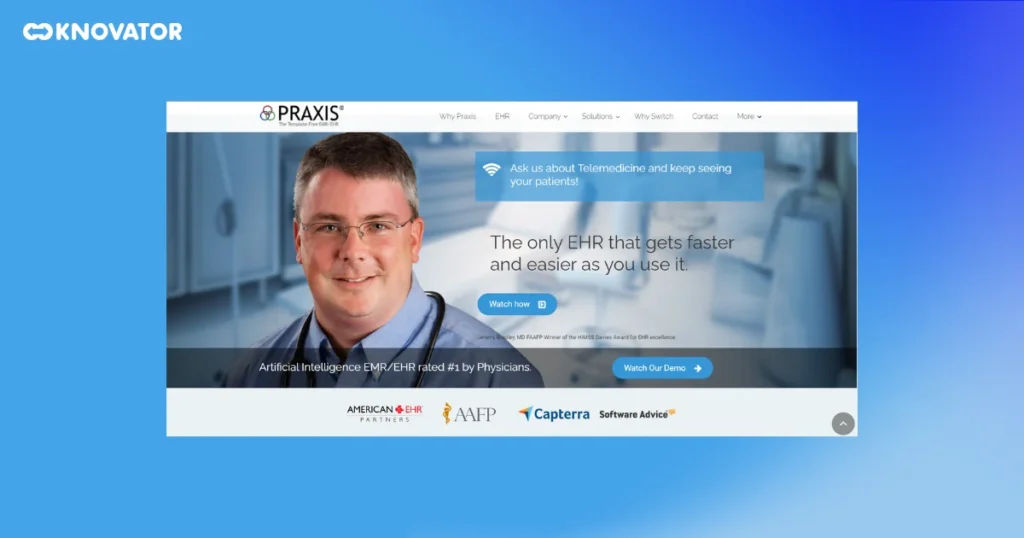 Praxis EMR is a template-free, AI-powered EHR software that helps healthcare providers to practice medicine in their own way. Gartner’s Software Advice ranks it as the top overall Electronic Health Record (EHR) in healthcare for 2021.
Praxis EMR is a template-free, AI-powered EHR software that helps healthcare providers to practice medicine in their own way. Gartner’s Software Advice ranks it as the top overall Electronic Health Record (EHR) in healthcare for 2021.
Praxis EMR’s AI engine improves at charting more quickly and efficiently as it learns from each user. This saves the physician’s time, which they can use to spend more time with patients. In addition, Praxis also eliminates medical errors by providing the best possible medical documentation.
3. Kareo Clinical
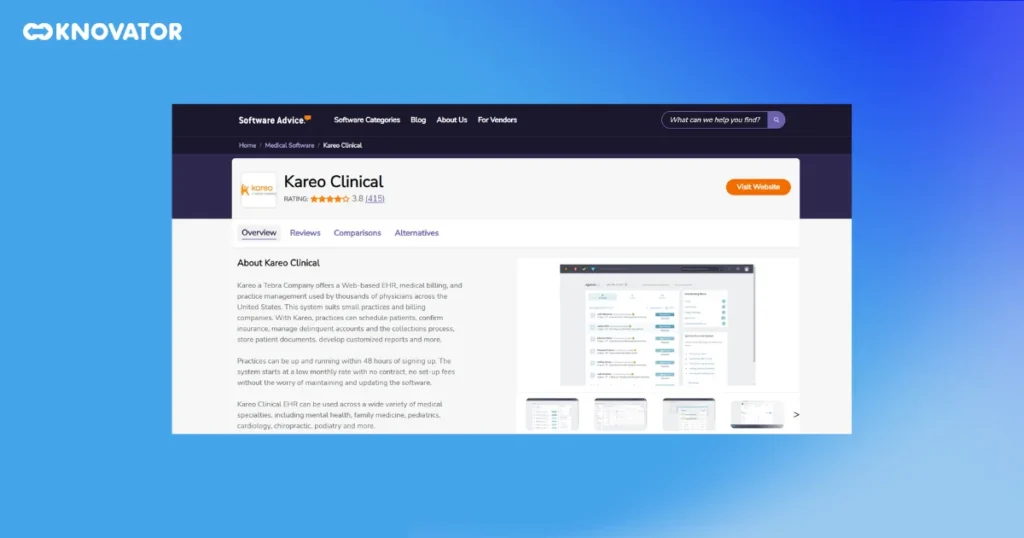 Kareo Clinical, an electronic health record software, aims to help healthcare providers efficiently manage their practices. It is easy to use and has a variety of features, including:
Kareo Clinical, an electronic health record software, aims to help healthcare providers efficiently manage their practices. It is easy to use and has a variety of features, including:
- Patient charts
- Electronic prescriptions
- Labs
- Messaging
- A patient portal
- Insurance authorization and enrollment
- Claims submissions, payments, statements, analytics, and scheduling
Besides, it is ONC-certified, which means that it meets the federal government’s Meaningful Use program requirements.
4. Meditech Expanse
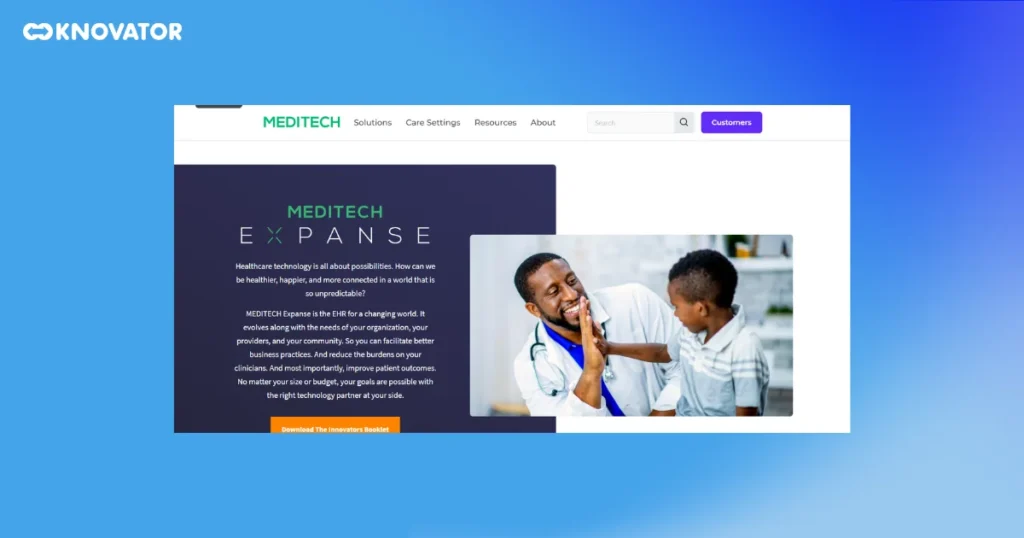 Meditech Expanse is a cloud-based EHR that helps providers make informed decisions. It provides access to the latest patient information wherever and whenever providers need it.
Meditech Expanse is a cloud-based EHR that helps providers make informed decisions. It provides access to the latest patient information wherever and whenever providers need it.
Expanse is a secure and scalable solution built on Google Cloud. Further, it offers a variety of features that support patient engagement, clinical decision support, and population health management. Also, KLAS has recognized Expanse as a top performer in multiple market segments.
5. NextGen Healthcare EHR
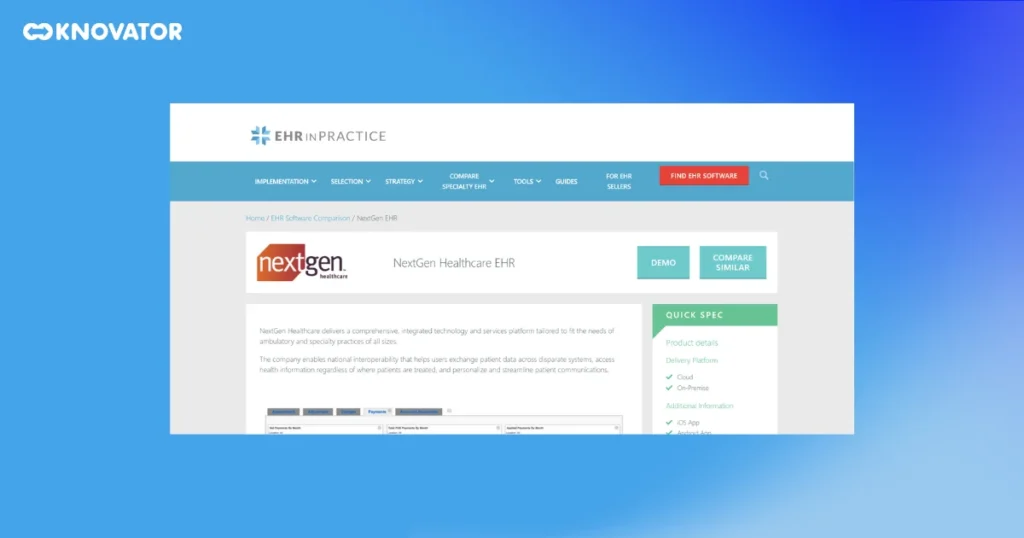 NextGen Healthcare EHR is an electronic health record that helps medical professionals improve the quality of care, streamline operations, and increase financial outcomes. It is a cloud-based solution that is flexible and scalable, making it a good fit for practices of all sizes. Further, NextGen Healthcare EHR is also highly customizable, so providers can tailor it to their needs.
NextGen Healthcare EHR is an electronic health record that helps medical professionals improve the quality of care, streamline operations, and increase financial outcomes. It is a cloud-based solution that is flexible and scalable, making it a good fit for practices of all sizes. Further, NextGen Healthcare EHR is also highly customizable, so providers can tailor it to their needs.
Some of the benefits of using NextGen Healthcare EHR include the following:
- Improved patient care
- Increased efficiency
- Reduced costs
- Improved compliance
- Enhanced reporting
6. Cerner
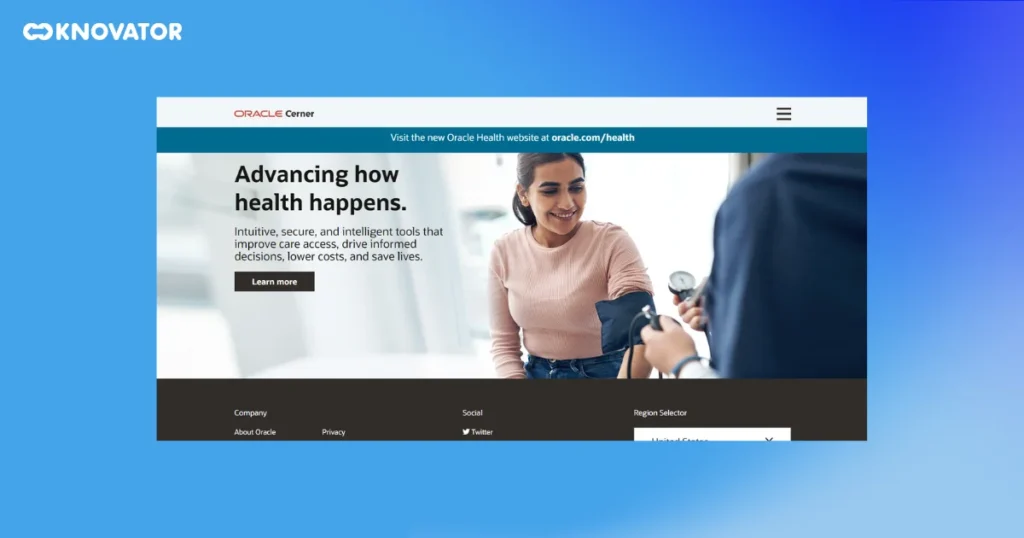 Cerner is a healthcare EHR software that provides a single source for patient information. It helps to improve patient safety and the overall patient experience by streamlining workflows and providing secure access to patient data. Cerner also offers a suite of solutions and services designed to help satisfy the demands of healthcare organizations.
Cerner is a healthcare EHR software that provides a single source for patient information. It helps to improve patient safety and the overall patient experience by streamlining workflows and providing secure access to patient data. Cerner also offers a suite of solutions and services designed to help satisfy the demands of healthcare organizations.
Here are some of the key features of Cerner as an electronic health records software:
- Single source of truth for patient information
- Secure access to patient data
- Streamlined workflows
- Improved patient safety
- Enhanced patient experience
- A suite of solutions to meet the claims of healthcare organizations
7. Centricity EMR
GE Healthcare is a leading provider of software for EHR. Hospitals, clinics, and other healthcare organizations worldwide use its Centricity EMR solution. Centricity EMR is a comprehensive software suite with modules for patient registration, scheduling, clinical documentation, billing, and reporting. It is designed to assist healthcare organizations in improving the quality of care, minimizing costs, and improving patient satisfaction.
8. eClinicalWorks
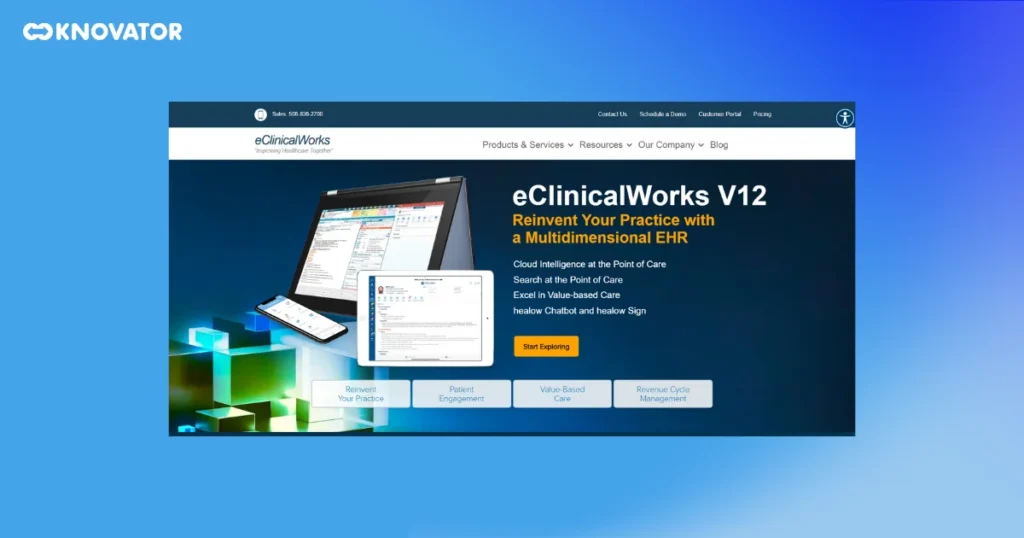 eClinicalWorks is a cloud-based EHR software that helps healthcare providers manage their practices more efficiently. The program includes electronic health record (EHR) templates, smart forms, and interoperability. This allows providers to quickly and easily create and access patient records, order tests, and communicate with other providers.
eClinicalWorks is a cloud-based EHR software that helps healthcare providers manage their practices more efficiently. The program includes electronic health record (EHR) templates, smart forms, and interoperability. This allows providers to quickly and easily create and access patient records, order tests, and communicate with other providers.
eClinicalWorks is used by over 150,000 healthcare providers in the United States. Moreover, it is a comprehensive EHR software that can help medical professionals improve patient care quality.
9. Allscripts
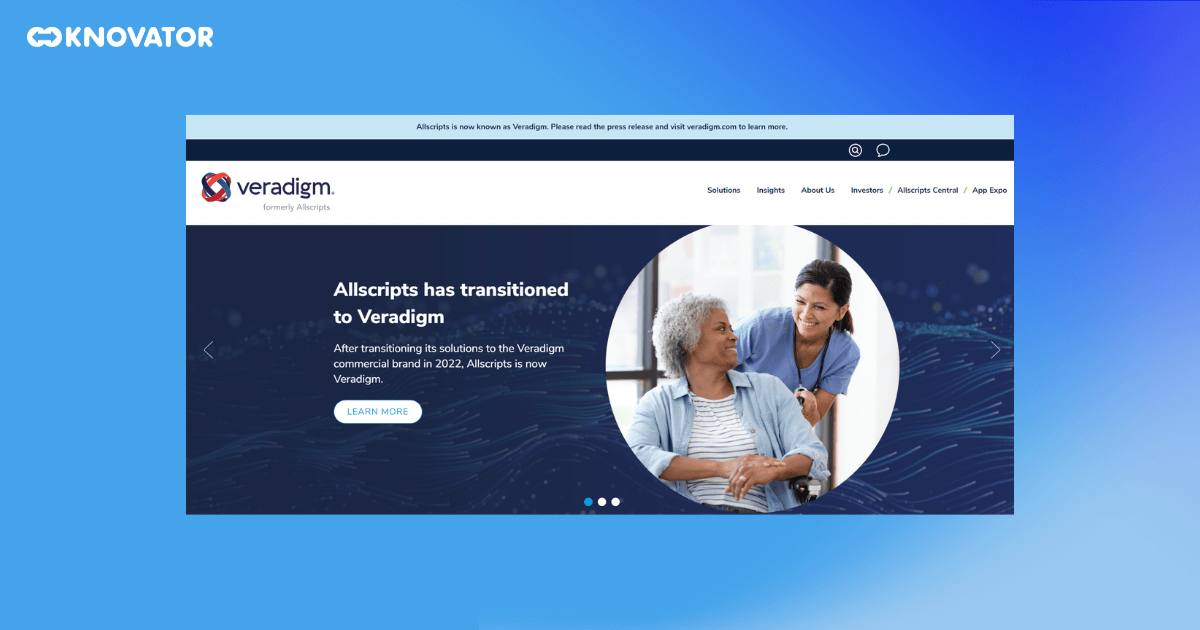 Allscripts is an EHR software that helps healthcare organizations manage their clinical and operational needs. It provides a unified platform for storing and accessing patient data, including electronic health records, lab results, and prescriptions. This allows providers to make better decisions about patient care and enhance the overall quality of care.
Allscripts is an EHR software that helps healthcare organizations manage their clinical and operational needs. It provides a unified platform for storing and accessing patient data, including electronic health records, lab results, and prescriptions. This allows providers to make better decisions about patient care and enhance the overall quality of care.
Allscripts is a leading provider of EHR software, and its solutions are used by over 170 million patients worldwide. The organization is committed to providing innovative solutions that help healthcare institutions improve the quality of patient care.
10. AthenaHealth
 AthenaHealth is a company that provides electronic health records (EHR) solutions for medical practices. Healthcare providers can easily store, manage, and access patient data with their cloud-based platform.
AthenaHealth is a company that provides electronic health records (EHR) solutions for medical practices. Healthcare providers can easily store, manage, and access patient data with their cloud-based platform.
For example, a doctor can pull up a patient’s medical history, test results, and medication list with just a few clicks, all in one place. This simplified approach to managing patient data allows for better communication between healthcare providers, thereby, improving patient care. AthenaHealth’s EHR system is just one example of how technology improves the healthcare industry.
11. AdvancedMD
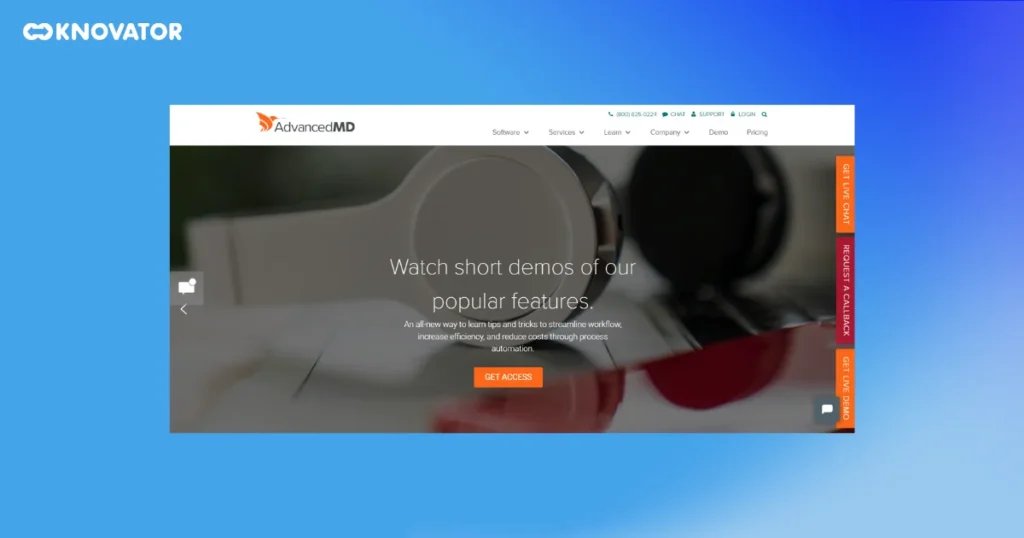 AdvancedMD simplifies practice management by automating scheduling, billing, and documentation tasks. It includes e-prescribing, charting, and telemedicine integration to improve efficiency and patient care. The software is designed to work for different medical specialties and allows for easy collaboration and communication among healthcare teams. Overall, AdvancedMD meets industry standards and can be used by practices of all sizes.
AdvancedMD simplifies practice management by automating scheduling, billing, and documentation tasks. It includes e-prescribing, charting, and telemedicine integration to improve efficiency and patient care. The software is designed to work for different medical specialties and allows for easy collaboration and communication among healthcare teams. Overall, AdvancedMD meets industry standards and can be used by practices of all sizes.
12. ModMed
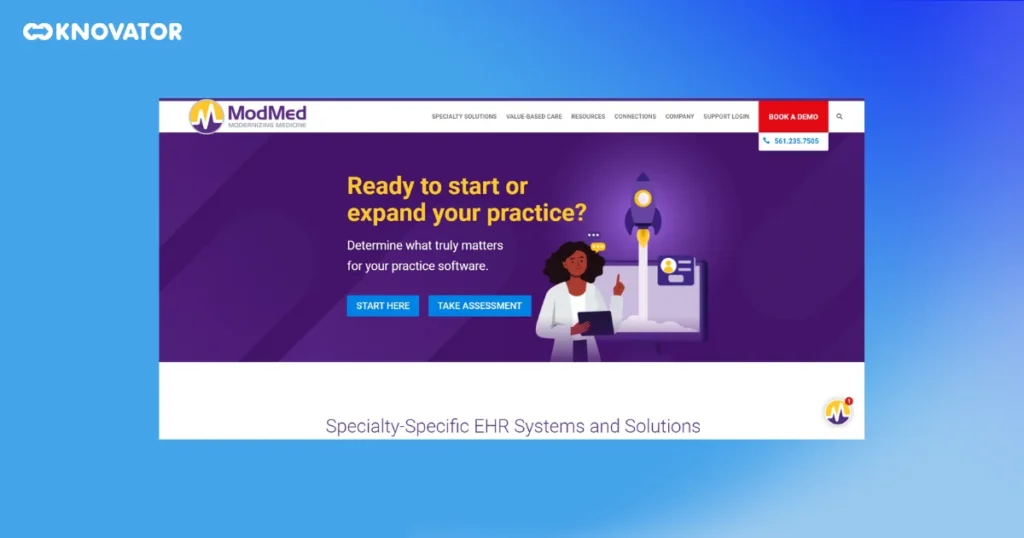 The purpose of ModMed is to assist healthcare providers in enhancing the quality of care they offer to their patients. As a cloud-hosted software, this solution allows users to access it from any internet-connected device.
The purpose of ModMed is to assist healthcare providers in enhancing the quality of care they offer to their patients. As a cloud-hosted software, this solution allows users to access it from any internet-connected device.
ModMed also has a built-in MIPS solution, which helps providers track their progress toward meeting MIPS requirements. Additionally, ModMed offers a variety of features that can help providers improve their efficiency, such as automated documentation and patient portals.
Benefits of EHR Software
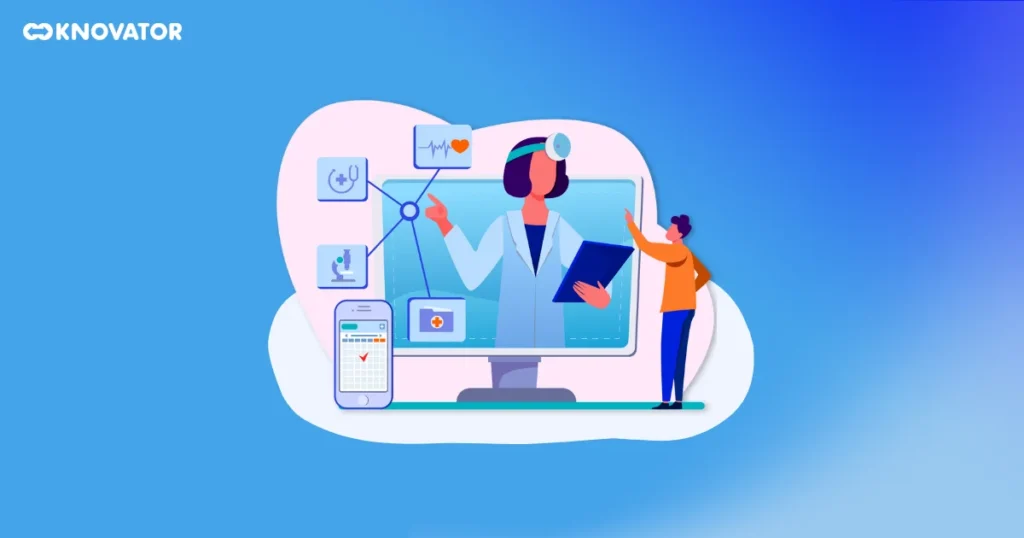 After understanding what EHR software is and discovering the different types of EHR software systems, it’s essential to understand the benefits of EHR software.
After understanding what EHR software is and discovering the different types of EHR software systems, it’s essential to understand the benefits of EHR software.
Here are the benefits of EHR software:
- Improved patient care
EHRs provide accurate, up-to-date patient information, which can lead to better diagnoses and treatment decisions. They can also help to reduce medical errors and improve patient safety.
- Increased efficiency
EHRs can streamline workflows and reduce paperwork, freeing up time for clinicians to see more patients. They can also help to improve communication between healthcare providers and facilitate care coordination.
- Cost savings
EHRs can help save money in several ways, including minimizing the need for transcriptions, physical chart storage, and coding and claims management. They can also help improve patient outcomes, lowering healthcare costs overall.
Transform Patient Care with EHR Software Solutions
As you just saw, choosing the right EHR software is critical for medical professionals to improve patient care and streamline their practice. With so many options available, it can be overwhelming to make a decision.
However, by considering user-friendliness, customization, and security factors, medical professionals can narrow their choices and select the best EHR software that meets their unique needs. The 12 EHR software listed above are excellent options.
Ultimately, the right EHR software can help you, as a medical professional, provide better patient care while improving your efficiency and productivity.

